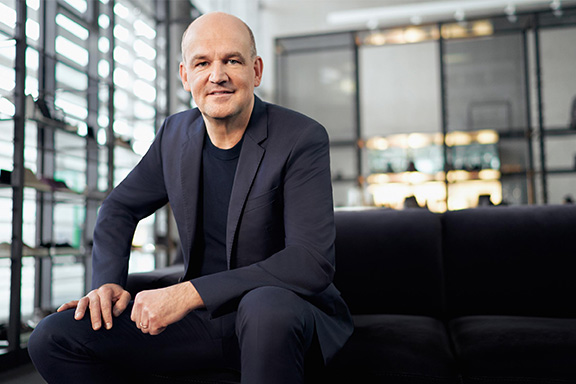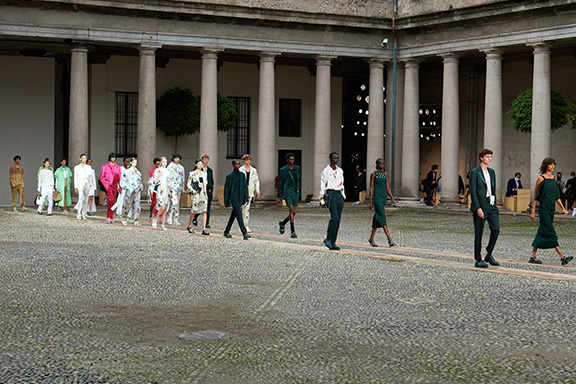Material external risks
HUGO BOSS is subject to a variety of external risks, mainly in connection with macroeconomic, political and social developments, environmental and health aspects, and competition.
Macroeconomic risks
As a global company, HUGO BOSS is exposed to macroeconomic risks in terms of global economic developments. This means that an economic downturn usually results in a decline in demand for premium and luxury goods that may have a negative effect on sales and earnings growth of the Group. The effects of macroeconomic developments can occur globally as well as being limited to one region, and may influence each other.
In order to reduce the impact of economic fluctuations, HUGO BOSS aims at a balanced regional distribution of sales. The Group continuously keeps a close eye on macroeconomic developments as well as the industry environment in order to identify risks at an early stage and be able to respond to them quickly. Internal early indicators are also analyzed regularly, which makes it possible to forecast the implications of potential macroeconomic risks. Group Management
Some of the possible reactions to a cyclical decline in demand include reducing production and sourcing activity, more strictly managing trade net working capital, increasing cost controlling and price adjustments.
In its publication of January 20, 2021, the IMF expects the global economy to recover noticeably in fiscal year 2021 from the recession caused by COVID-19 in fiscal year 2020. This outlook is mainly based on the assumption that vaccines will be widely available in industrialized countries and major emerging markets by the summer of 2021 at the latest. At the same time, the risks and uncertainties associated with this outlook remain high. For example, it is currently only difficult to predict to what extent the further development of the pandemic – for example, with regard to new waves of infection and lockdowns, or possible mutations of the virus – will ultimately impact the global economy over the course of the year. In addition, it is extremely difficult to predict any progress in the medical treatment of COVID‑19, the global availability and efficacy of the vaccines or any improvement in the consumer climate and the respective implications of these factors on the anticipated economic recovery.
The potentially negative impact of economic trends on Group sales and earnings performance may be fundamentally high in fiscal year 2021. Management judges the likelihood of occurrence as likely.
Outlook, Risk Report, Environmental and Health Risks
Political and social risks
HUGO BOSS is exposed to political and social risks as a result of the global nature of its business activities. For example, changes in the political and regulatory environment, geopolitical tensions, military conflicts, changes of government or terrorist attacks can have a negative impact on the consumer climate.
The Group does not expect global uncertainties regarding political and social developments to decrease in 2021. For example, geopolitical tensions in the Middle East or Hong Kong, an escalation of trade-policy conflicts such as the one between the U.S. and China, or the continuing threat of terrorist attacks, pose significant risks for the premium and luxury goods industry and thus also for the Group’s business performance.
In addition, uncertainties with regard to Brexit remain. The Company has responded to the imposition of import duties through moderate price increases as of January 1, 2021. The adjusted pricing structure is intended to ensure the Company’s positioning in the upper premium segment in future, and is also geared towards the pricing structure of relevant competitors. In principle, there is a risk that it will not be possible to enforce adjusted prices to the extent intended by the Company in the event of any cyclical decline in demand as a result of Brexit. This would ultimately have a negative impact on the Group’s sales and earnings performance. However, Management has assessed the remaining risks associated with Brexit for 2021 as unlikely, while having a significant impact.
Due to the high likelihood that its significance will increase, HUGO BOSS assesses the risk resulting from political and social changes as an “emerging risk”. It raises strategic questions, for example regarding the influence of demographic changes on consumer behavior and the supply chain. This reveals the close link between the social risk and the industry risk and the risks associated with the suppliers and sourcing markets. In evaluating and managing the risk, risk experts and risk owners work in interdisciplinary teams on the ongoing analysis and monitoring of current political and social developments and their impact on the Group’s business activity. The central risk management coordinates and supports this process.
The Group’s global distribution in more than 120 countries is intended to provide a natural hedge against adverse developments in individual countries or regions. Unexpected developments in important sales markets can have a high financial impact. The Management considers this likelihood of this risk to be possible.
Environmental and health risks
The global value chain of HUGO BOSS is subject to environmental and health risks that may result from pandemics or environmental and natural disasters as well as the consequences of climate change.
The further development of the COVID-19 pandemic is linked to significant risks for HUGO BOSS also in 2021. The main material uncertainties at the time of preparing this report relate in particular to the duration of the pandemic – including possible additional waves of infection, delays in vaccine distribution or virus mutations – and the negative consequences of the various restrictions on public life, especially global lockdown measures. With regard to the latter, there is a significant risk that the lockdowns implemented at the beginning of the year, particularly in Europe, including temporary store closures, will last longer than expected, or that there will be further, as yet unforeseeable, extensive lockdowns and temporary store closures in important markets for HUGO BOSS during the year. There is also a significant risk that a slower than expected improvement in consumer confidence or continued international travel restrictions over the summer could significantly slow down the gradual recovery expected for the year or even bring it to a complete standstill. In addition to lost sales opportunities, the occurrence of the described risks would ultimately also have a significant negative impact on the Group’s profitability and cash flow.
In addition, there are fundamental supplier and sourcing market risks connected to the pandemic. For example, in the event of a further deterioration of the situation in sourcing markets that are important for the Group, the production of individual suppliers or multiple suppliers may be temporarily interrupted. This could disrupt the Group’s value chain, which would pose additional risks for sales. Although no significant implications on the Group’s supply chain were observed either in fiscal year 2020 or at the time this report was prepared, the Company remains in close contact with its partners to ensure it is as well prepared for any bottlenecks as possible.
HUGO BOSS has set up various task forces and crisis teams to carefully monitor and mitigate the various impacts of COVID-19, with a focus on employee health and safety as well as business continuity. At Group level, there is an interdisciplinary coronavirus crisis team which closely monitors the course of the pandemic and comprehensively coordinates all measures taken by the Group to protect its employees. In addition, as part of Group management, a particularly close and regular exchange between the Managing Board, Group Controlling and the management of the corporate divisions and the Group companies has been taking place since the beginning of the pandemic. Group Management
Overall, Management considers the risks above and beyond the financial impacts already taken into account in the “Outlook” section for 2021 to be fundamentally possible. The effect on earnings performance is classified as high. Outlook, Material Operational Risks
Risks as a result of climate change, such as increasing water scarcity, are considered as unlikely for fiscal year 2021, and are associated with low possible loss. In the future, however, this risk could become more significant for HUGO BOSS. In the long term there is a risk that an increasing scarcity of water could have negative consequences on the cultivation of cotton, leading to a reduced availability of cotton fibers and higher material costs as a result. Cotton is by far the most used material in the Company’s products.
HUGO BOSS has a central emergency management system in order to be able to react promptly and appropriately to an environmental or natural disaster occurring. Its structural organization pools cross-functional skills needed to handle emergencies and is intended to ensure efficient coordination with clear decision-making paths. Overall, in 2021 Management anticipates that the environmental and health risks will have possible high implications on the net assets, financial position and results of operations.
Competitive risks
The competitive environment of HUGO BOSS is fundamentally characterized as being highly dynamic. Changes in the competitive environment may influence the Company’s success, particularly in the medium to long term. Thus, HUGO BOSS is in direct competition with well-known clothing manufacturers in the premium segment for customers, but also for production capacity, retail space in preferred locations and brand ambassadors. In addition, BOSS and HUGO are increasingly competing with a large number of global and regional brands with strong credibility in casualwear and streetwear aimed at younger consumers – in particular in the highly competitive casualwear segment. Intensive competition for customers may in principle lead to harmful competitive behavior, such as persistently intensive discounting. Aggressive competitive behavior could also lead to higher marketing costs, which in turn could damage the Company’s profitability and market position.
The Group is convinced that further increasing the desirability of its two brands, BOSS and HUGO, is the most important factor for its long-term success. All strategic initiatives are therefore aimed at sustainably increasing brand desirability. HUGO BOSS always puts customers and their needs at the center of its actions. From a brand perspective, the main goal of the Group is to significantly increase the attractiveness and awareness of BOSS and HUGO in the long term. From a sales point of view, the Company’s main goal is to take full advantage of its omnichannel capabilities, which have been developed over the last few years, and to link all customer touchpoints to a seamless, consistent customer experience. Although HUGO BOSS considers itself generally well positioned in international competition, the risks considered possible in this regard nevertheless have significant financial implications. Group Strategy


